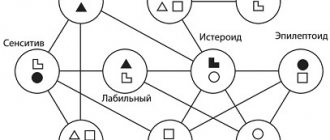Character traits
Sensitive people are overly sensitive, so they often experience stress, which gradually destroys their health, both physical and sometimes mental. For example, it is among this type of accentuation that phobias, psychoses and depression are most often observed.
The unpleasant situations they experience are not assimilated as experience on which they can later rely. On the contrary, they serve as a kind of limiter of actions. Fearing repetition, they withdraw into themselves and refuse to take risks and try new things.
They are very demanding of themselves; for any slightest mistake they will indulge in self-criticism and self-deprecation. Therefore, any failures are perceived as the end of the world, and it takes a long and difficult time to recover from them.
But success is attributed only to fortunate circumstances, completely devaluing the efforts they put into achieving it.
He does not like large companies, preferring intimacy; only then is he able to reveal himself to the fullest.
If you communicate with him rudely, in a raised voice, he will definitely withdraw into himself and avoid future meetings with such a person.
Sensitive people have highly developed morality, you can certainly rely on them, they will fulfill their duty no matter what the circumstances, with the exception of moments when they are afraid of publicity, and so on. Then they can give up and run away from the scene.
Usually they are not interested in alcohol and drugs, and even have an extremely negative attitude towards smoking.
Perhaps because in an altered state they do not experience euphoria, but only begin to blame themselves even more for incorrect behavior and bad habits. And the level of self-deprecation is already quite high, in contrast to self-esteem.
In society, such people are considered the most decent, honest, with a developed sense of justice and morality.
Sensitive Personalities
Self-doubt is an everyday mental phenomenon. People speak of insecure, or, better, sensitive, individuals when, as a result of this lack, people suffer and enter into conflicts. Sensitive people are highly susceptible and impressionable. They do not show persistence, are sensitive and vulnerable, they “swallow” anger and worries, but carry them within themselves for a long time and heavily, without expressing them. Aggravating experiences and conflicts are not repressed, rejected or isolated in the sense of the defense mechanisms described above; they remain in consciousness and remain emotionally rich. Sensitive people are prone to stuckness and retention of affect: the ability to manage oneself and, above all, the ability to process and express affect are insufficient. This applies most of all to aggressive impulses (suppression of aggression). Only with significant stagnation of affect do sudden strong explosions occur. Sensitive personalities, according to Kretschmer, are determined by an asthenic structure with a strong sthenic sting.
Conditions of occurrence and biographical features
Many sensitive individuals lost their father in childhood (or were born out of wedlock); Others' fathers are often weak and have little interest in raising children. As a result, children (or adolescents) cease to see the ideal in their father and come into conflict with him. This can be associated with the fact that sensitive people have a strict self-ideal, in which a conflict arises between “to be” and “to be able to”. A single mother, contrary to reality, tries to idealize the father in the eyes of the child; in upbringing, she tries to replace the father and takes on a double function; the child becomes a substitute for the spouse (Richter), at least (often out of fear of separation) the mother tries to tie the child to herself, she protects him and relieves him as much as possible. At the same time, the mother creates for herself an ideal picture of her son, expecting conscientiousness, ambition and success from him. With this approach, the Personality becomes, on the one hand, impressionable, soft and vulnerable, and on the other, vain and emphatically neat. As a result of this development, her special dependence on the assessment of others can be determined. “Hypersensitivity to recognition and refusal is associated with a strong superego function and with a strict self-ideal and arises as a result of the behavior of a loving mother, who at the same time resists the manifestations of the child’s needs” (Kuiper). Self-doubt ultimately means that self-esteem cannot fall apart from the inside (since experiences and behavior are not satisfied by the demands of the super-ego and the claims of the ego-ideal) and needs support from the outside.
A sensitive person is generally sociable and capable of love, but in love he prefers a passive role. In contrast, sensitive people, when self-defense is necessary, are often active and courageous. The choice of a partner is slow and with conflicts, but then the marriages are strong and lasting.
In education and work, conflicts often arise between “can” and “strive,” which leads to crises of self-esteem if success and especially clear recognition do not come. This annoyance is all the stronger the more professional success should lead to compensation for feelings of inferiority in relation to one’s own personality. Sensitive people often experience military service and war as their “best time,” since in such situations orders eliminate the need to make their own decisions, they experience a sense of camaraderie and the recognition they seek; this style of life allows you to suppress the passive part of the personality structure and weaken the conflict between the I-ideal and the Self.
This experience shows that the sensitive structure can be assessed with equal justice both as a character neurosis and as a psychopathy.
Therapy
Sensitive individuals relatively rarely seek medical help. Clinical symptoms consist predominantly of depressive crises of self-esteem and even more often of hypochondriacal conditions. Psychotherapy aims to process current conflict situations and thereby help the patient better understand his structure and especially the possibilities of defensive behavior, as well as learn the positive aspects of his structure: subtle sensitivity, attentiveness, justice and the possibility of empathy, which can have a positive impact on interpersonal relationships when the back the defense plan recedes and the I function comes into play. Along with a psychotherapeutic conversation, self-confidence training is shown, in which an adequate balance is achieved between aggressive affect and criticism, for example in a role-playing game. The prognosis is favorable; many sensitive individuals achieve success in life’s struggles.
Passive-aggressive personality disorders. Such people do not take their aggressiveness outwardly, but leave it latent, and therefore prefer to express themselves through passive behavior: they use forgetfulness and unpunctuality, counterclaims and delays to counteract the claims that are presented to them in their personal, work and social life. The consequence is an ineffective lifestyle, especially if the behavior is persistent and extends into situations that could facilitate positive attitudes and activity. The concept of these personality disorders also comes from military experience. Apart from the expressed forms, such erased forms of behavior can often be found in the work environment.
The psychodynamic explanation of this type of personality development involves the behavior of parents who punish children’s attempts at independence and perseverance, demanding obedience from the child, even with ambivalent hesitations. Throughout life, this type of personality disorder becomes permanent. Psychotherapy is carried out in the same way as for sensitive personalities, with whom these and the following personality disorders (both mentioned in American psychiatry) are closely associated.
Avoidant personality disorder Avoidant personality disorder (DSM III), including social-phobic personality disorder (DSM IV), is defined by insecure self-esteem, hypersensitivity, especially when rejected; even minor, small and everyday failures cause deep vulnerability. Therefore, individuals with this disorder try to avoid human relationships other than the most necessary ones. Despite the need for contact, they keep their distance from people; with a great wealth of feelings, they show them ineptly.
Classification . According to ICD 10, sensitive individuals together with evasive individuals - F60.6; passive-aggressive personality disorder—F60.8.
Childhood
Sensitive children are usually called “homey”, and all because they do not want to spend their free time with noisy and active peers. Moreover, they do not play outdoor games, during which you can get hurt or get tired.
They are obedient because they are very impressionable and vulnerable, which is why they have a hard time experiencing any criticism and disapproval from adults. Therefore, in order to avoid getting into such unpleasant situations, they adapt to any rules and requirements of those with whom they have to interact.
It is not difficult to understand that a child belongs to this character accentuation - he is afraid of everything in the world. Starting from darkness, loneliness and ending with the fear of various animals and insects. Some even develop cynophobia, that is, an irrational, uncontrollable fear of dogs.
They are timid and shy, usually hiding behind mom or dad when meeting other people. If they turn to them, they are silent and do not look them in the eyes.
This happens not because they are not interested in communicating, it’s just that at this moment it is so difficult for them to cope with their feelings that they are not able to squeeze out even a few words.
Free time is spent reading, modeling, and drawing. They love to tinker with babies, teach them something, change clothes, feed them, and so on.
At first glance, it seems that they are completely unsociable, but this is not so. People whom they are accustomed to and can trust have the opportunity to know the full depth of their inner world.
Socionics and other typologies
Sensitive type
Shyness and timidity are evident from childhood. Such children are often afraid of the dark, avoid animals, and are afraid of being left alone. They are alienated from overly lively and noisy peers, do not like overly active and mischievous games, risky pranks, avoid large groups of children, feel timid and shy among strangers, in a new environment, and are generally not inclined to easily communicate with strangers. All this sometimes gives the impression of isolation, isolation from the environment and makes one suspect autistic tendencies characteristic of schizoids. However, with those to whom these children are accustomed, they are quite sociable. They often prefer playing with children to their peers, feeling more confident and calm among them. The early interest in abstract knowledge and “childish encyclopedicism” characteristic of schizoids also does not appear. Many people willingly prefer quiet games, drawing, and modeling to reading. They sometimes show extreme affection for their relatives, even with a cold attitude or harsh treatment on their part. They are distinguished by their obedience and are often known as “home children.”
School frightens them with crowds of peers, noise, fuss, bustle and fights during recess, but, having become accustomed to one class and even suffering from some of their fellow students, they are reluctant to move to another group. They usually study diligently. They are afraid of all kinds of tests, checks, and exams. They are often embarrassed to answer in front of the class, afraid of being confused or causing laughter, or, conversely, they answer much less than what they know, so as not to be considered an upstart or an overly diligent student among their classmates.
The onset of puberty usually occurs without any particular complications. Difficulties in adaptation often occur at 16-19 years of age. It is at this age that both main qualities of the sensitive type, noted by P. B. Gannushkin, appear - “extreme impressionability” and “a sharply expressed sense of one’s own insufficiency” (Gannushkin, 1964).
The emancipation reaction in sensitive adolescents is rather weakly expressed. Childhood attachment to relatives remains. They not only tolerate the care of elders, but even willingly submit to it. Reproaches, lectures and punishments from loved ones are more likely to cause tears, remorse and even despair than the protest usually typical of teenagers...
A sense of duty, responsibility, high moral and ethical requirements both for others and for oneself is formed early. Peers are terrifying with their rudeness, cruelty, and cynicism. I see many shortcomings in myself, especially in the area of moral, ethical and volitional qualities. The source of remorse in male adolescents is often masturbation, which is so common at this age. Self-accusations of “vileness” and “licentiousness” arise, cruel reproaches of oneself for the inability to resist a harmful habit. Onanism is also attributed to its own weakness of will in all areas, timidity and shyness, failures in studies due to allegedly weakening memory, or thinness, disproportion of physique, sometimes characteristic of the period of growth, etc.
The feeling of inferiority in sensitive adolescents makes the overcompensation reaction especially pronounced. They seek self-affirmation not away from the weak points of their nature, not in areas where their abilities can be revealed, but precisely where they especially feel their inferiority. Girls are eager to show their cheerfulness. Timid and shy boys put on a mask of swagger and even deliberate arrogance, trying to show their energy and will. But as soon as the situation, unexpectedly for them, requires bold determination, they immediately give up. If it is possible to establish trusting contact with them and they feel sympathy and support from the interlocutor, then behind the fallen mask of “nothing at all” there appears a life full of reproaches and self-flagellation, subtle sensitivity and exorbitantly high demands on oneself. Unexpected participation and sympathy can replace arrogance and bravado with stormy tears.
Due to the same reaction of overcompensation, sensitive teenagers find themselves in public positions (prefects, etc.). They are nominated by educators, attracted by obedience and diligence. However, they are only sufficient to carry out with great personal responsibility the formal side of the function entrusted to them, but informal leadership in such teams goes to others. The intention to get rid of timidity and weakness of will pushes boys to engage in strength sports: wrestling, dumbbell gymnastics, etc.
Unlike schizoids, sensitive teenagers do not isolate themselves from their friends, do not live in imaginary fantasy groups and are not able to be the “black sheep” in the ordinary teenage environment. They are picky in their choice of friends, prefer a close friend to a large company, and are very affectionate in friendship. Some of them like to have older friends. An ordinary teenage group terrifies them with the noise, swagger, and rudeness that prevail there...
Sensitive teenagers are not prone to alcoholism, drug use, or delinquent behavior. Sensitive young men, as a rule, do not even smoke; alcoholic drinks can inspire disgust in them...
The self-esteem of sensitive adolescents is distinguished by a fairly high level of objectivity. One notices the touchiness and sensitivity characteristic of childhood, shyness, which especially interferes with making friends with whomever one wants, the inability to be a leader, ringleader, the life of the party, dislike of adventures and adventures, all kinds of risks and thrills, aversion to alcohol, dislike of flirting and courtship. They emphasize that they are neither inclined to quarrel easily nor to make peace quickly. Many of them have problems to which they cannot define their attitude or do not want to do so. Most often, these problems are the attitude towards friends, towards one’s environment, towards criticism towards oneself, towards money, towards alcoholic drinks. Apparently, all this is connected with colored emotions, hidden experiences. Disgusting lies and disguises, sensitive teenagers prefer refusal to lies.
The weak link of sensitive individuals is the attitude of others towards them. They find it intolerable to be in a situation where they become the object of ridicule or suspicion of unseemly acts, when the slightest shadow falls on their reputation or when they are subjected to unfair accusations...
Author - Lichko A.E. “Psychopathy and character accentuations in adolescents”
New articles:
- Epileptoid type
">Schizoid type
- Cycloid type
Old articles:
- Psychasthenic type
">Unstable type
Education
They study diligently so that they don’t have to feel ashamed of their poor performance in front of the whole class. If classmates offend you and you can’t establish contact with them, they still refuse to move to another school.
Adaptation is not easy, which is why it is easier for them to endure bullying than to adapt to new conditions again, to get used to other complete strangers.
When called to the board and asked something, they are ready to receive a low mark, despite the fact that they know the answer, just so as not to have to squeeze it out of themselves in front of everyone. Therefore, their written work is usually excellent, but their oral work is not so good.
It seems to them that if they utter even one word in public, their classmates will laugh at them and, in general, the whole school will subsequently tease them.
Or they will tell everything they know, get a good grade, and others will consider this act as an attempt to stand out and begin to persecute and mock.
Puberty
For parents, their child's teenage years pass almost unnoticed. This means the absence of conflicts, escapes from home, riots, and whims.
And all because it manifests itself completely differently from others. Sensitive people simply become even more impressionable and self-critical; it seems to them that they are literally underdeveloped and do not reach the level of ordinary normal people.
Why are they completely immersed in the process of self-flagellation, thinking about their difficult fate. If an adult tries to encroach on freedom or lectures, instead of the explosion of emotions typical of teenagers due to hormonal changes, they will simply withdraw even more into themselves, spending the entire evening in tears and experiencing despair.
They suffer from remorse in matters that usually do not bother other children at that age. For example, masturbation is considered a manifestation of weakness of spirit, and not a completely natural need of a growing and changing organism.
They are unable to stop trying to self-satisfy, which is why after each episode they suffer, blame themselves, and sometimes even punish themselves by restricting them in some way. In general, all the troubles that happen later are considered retribution for a shameful hobby.
They are afraid of their peers because they seem cruel, aggressive, or too successful and ideal. In order to be close to them, sometimes they try to fit in, playing the role of cheeky and arrogant personalities, sometimes out of place cheerful and carefree.
But when those around them, to whom they pretended, become closer to them, they reveal their true character, which is incredibly surprising.
Let’s say that if an unpleasant incident occurred and someone took pity on the sensitive person, despite the fact that he tried to show that he was not at all upset about such a trifle, he would begin to cry loudly, instantly losing his pompous image and becoming “real.”
Sensitive type of character accentuation according to A.E. Lichko
The sensitive type of accentuation develops in people who have such character traits as sensitivity, empathy, some exaltation, excessively high demands on themselves and ethical and social standards. Due to certain life events, they become suspicious, cautious, and withdrawn. Behind all this is a pronounced feeling of “own insufficiency” [Gannushkin, 1933] (A.E. Lichko, p. 91, 2010).
Despite the fact that sensitive accentuation is formed at puberty, during independent entry into social life, anxiety and fearfulness can be detected in such children in childhood. Along with the usual children's fears (the dark, animals, etc.), one can see in them the fear of loneliness (the fear of being alone with oneself, expressed in the form of the fear of being alone). Sensitive children avoid active peers, do not take part in active and mischievous games, risky pranks, try to avoid large companies and crowds of people, and get lost when communicating with strangers. But they are very sociable and open to those with whom they are familiar. Such children can often be seen playing with younger ones, because in their society, sensitive people feel much more confident and stable. They prefer quiet games, modeling, and drawing. Sometimes they become very attached to their family, even if the family exhibits cold or harsh behavior towards them. They are distinguished by their obedience, for which they are called “home children.”
School, as a society with its own rules, activity during breaks, active and noisy classmates, frightens such children. At the same time, they quickly get used to the team so much that they suffer from moving to another school, even if there were those in the old team who bullied or offended them. Usually their school performance is good, although the situation of testing and assessing their knowledge is equated by them with assessing their personality. Situations of answering in front of the class frighten them, because... they are afraid of ridicule of them or their mistakes; in some cases, in order not to be considered a “crammy” or an “upstart”, they may answer worse than they could.
The onset of adolescence passes without complications. Typically, difficulties begin at the time of graduation from school and the transition to a new educational institution or place of work, due to the fact that there is a forced need to establish new social connections.
The emancipation reaction in sensitive adolescents is usually weakly expressed. They willingly submit to situations of guardianship over them by older and more experienced people. Dissatisfaction, disapproval, indications of mistakes or weaknesses of their personality are perceived excessively emotionally, to the point of tears and despair. They prefer not to argue with elders and not to resist their decisions and instructions. At the same time, quite early they begin to develop a sense of duty, responsibility, high moral and ethical requirements for themselves and for others. Peers often seem to them to be excessively cruel, rude and angry. They tend to blame themselves for a large number of shortcomings.
The feeling of their own inferiority is expressed in such adolescents in a very interesting way - they follow the path of overcompensation, but not in the area where they could really achieve success, but in the one where they feel especially insecure, stupid and inexperienced. Girls try to show themselves as sociable and cheerful, young people - cheeky, arrogant and brave. But in situations where these qualities really need to be demonstrated, they retreat. Such teenagers are seen as real only by those who have been able to establish warm and trusting contact with them.
Due to the same overcompensation, they often find themselves as formal leaders (class president, group leader) on the initiative of teachers, due to their good manners and diligence. At the same time, they perform formal work, while another person is the true leader.
Adolescents with sensitive accentuation enter reference groups on the basis of warmth and trusting contacts. Instead of a large and noisy company that scares them, they prefer a few close friends.
The hobbies of such teenagers may be suitable to their inner world (music, art, chess, flower growing), but can also strongly contrast with it (wrestling, gymnastics, extreme sports).
The formation of one’s own sexuality is associated with a feeling of one’s own inferiority. If a teenager has an object of desire, then all complexes acquire new strength. Often teenagers never admit their feelings. However, the opposite situation is also possible - overcompensation imparts such determination that it simply frightens the object of love, which also exacerbates the feeling of inferiority, which, in turn, leads to the appearance of suicidal thoughts.
Suicidal thoughts can be expressed in two ways. The first is the actual thoughts of suicide, which do not find attempts to realize them and remain thoughts. The second option is true suicidal attempts, devoid of any demonstrativeness, committed under the influence of a chain of unpleasant events, each of which hurt the teenager’s pride.
Often sensitive teenagers do not drink alcohol or drugs, and often even treat smoking with disgust. If they drink alcoholic beverages, they do not cause a state of euphoria, but, on the contrary, plunge them into depressive states with a new round of feelings of self-inferiority.
The self-esteem of such adolescents is most often objective and correct.
The point of least resistance for them is the attitude and assessment of others. The situation in which they are subjected to ridicule, suspicion or accusations is painful and intolerable for them.
In preparing this article, materials from Lichko A.E. were used. Psychopathy and character accentuations in adolescents. - St. Petersburg: Rech, 2010. - 256 p.
Recommendations
- To increase your self-esteem, you should engage in activities that bring pleasure and interest. Typically, sensitive people try to develop their weak points, which is why they go into aggressive sports, try to build a career, often speaking in front of the public, and so on. This is called overcompensation, that is, a person seems to be trying to prove to himself that he is able to cope with his weaknesses, that he is not a coward. If you like reading books, cross-stitching and playing the guitar, spend time on these activities instead of jumping with a hated parachute, boxing competitions, wrestling, etc.
- If your child has such a sensitive character, handle him carefully; hardening and preparing for a harsh social life can turn into failure, only increasing the development of phobic disorders.
- Work on your self-esteem, it should definitely be increased. Then you will be able to achieve a feeling of inner harmony, torment and anxiety will go away. Excessive demands on yourself will not help you become better, but will only hasten the appearance of neurosis and other mental disorders.
- Learn to rely on your feelings and desires, without adjusting to others. You can’t please everyone in the world, but you can ruin your life by pushing your own ambitions into the background.
- Dose the loads of such a child, otherwise, having made a mistake due to fatigue, he will decide that he is a loser. Avoid being overly protective of him, give him the opportunity to gain experience and learn something. Because by doing his job, you will only confirm his ideas about insignificance and inability to cope with difficulties on his own.









